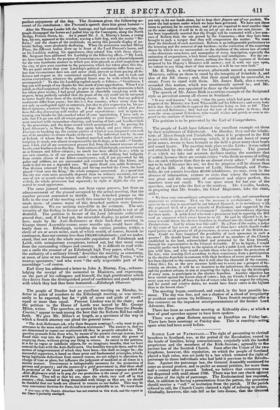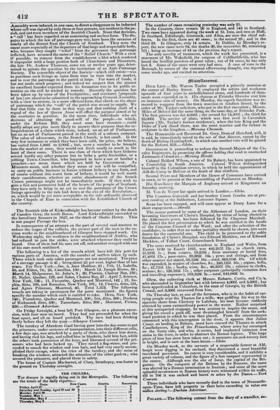SCOTCII LAW OF PATRONAGE.—The right of presenting to clerieal benefices
in Scotland, was, at the period of the Revolution, vested rig the heads of families, being communicants, conjointly with the landed proprietors and the members of the Kirk-Session; agreeably to the ancient law of the Scottish Church. Soon after the Union of the tiro kingdoms, however, this regulation, on which the people of Scotland placed a high value, was set aside by a law which restored the right of patronage to those individuals who had held it previous to the Revolu- tion. Against the patronage law, the General Assembly continuedrto enter an annual protest, and to prefer an annual petition, for more than half a century after it passed. Indeed, we believe that ceremony was not dispensed with until about 1780. There was but one check against the abuse of the right of patronage. The Ecclesiastical law required, that, in addition to having a presentation from the patron, the presentee should receive a "call " or invitation from the parish. If the parish refused to call, the Church Courts claimed a right of refusing to ordain. Gradually, however, this rule fell so far into disuse, that the General Assembly were induced, in one ease, to direct a clergyman to be inducted whose call was signed by only three or four persons, not resident in the pa- rish, and not even members of the Scottish Church. Since that decision, a " has been regarded. as an unmeaning and useless form. The dis- putes to which the. law. of patronage gave rise, have been the occasion of nearly all the dissent from. the" ChUrch of Scotland. They were the cause more especially of the departure of that large and respectable body, who, because they sought " relief" from the grievance that patronage inflicted, have assumed the name of the " Relief Church." With a view if possible, to remove from the establishment a blot which rendered • it unpopular with a large portion both of Churchmen and Dissenters, the late Dr. Andrew Thomson, some ten or twelve years ago, deter- mined to agitate the question by the institution of an Anti-Patronage 'Society. The ostensible object of the Society—which still exists—was to purchase such livings as came from time to time into the market, and to vest the patronage in the parish at large. For want of funds, it has not made much progress ; and indeed we suspect that the utmost its excellent founder expected from its formation was to fix public at- tention on the evil he wished to remedy. Recently the question has been taken up by some of the Presbyteries ; and overtures [proposals of law] are about to be submitted to the approaching General Assembly, with a view to restore, in a more efficient form, that check on the abuse of patronage which the "call" of the parish was meant to supply. We fear that little can be done in that way, and that nothing short of a repeal of the law of Queen Anne will effect the purpose aimed at by the overtures in question. In the mean time, individuals who are desirous of obtaining the good-will of the people—to which, under the Reform Bill, they must soon have recourse—could hardly adopt any plan more likely to answer their. purpose than the re- linquishment of a claim which rests, indeed, on an act of Parliament, but on an act of Parliament passed in the teeth of a solemn compact. The value of advowsons, in the Scotch Church, is but small. In the very few instances in which they have been sold, the price, we believe, has varied from 1,0001. to 2,0001. ; but, were a number to he brought into the market at once, they would not fetch nearly so much as the least of these sums. There is one class of them which have hitherto served hardly any other purpose but to bribe a petty freeholder, or a jobbing Town-Councillor, who happened to have a son or brother a preacher—we mean those which are held by Government. As Ministers mean, and whether they mean or not will be compelled, to carry on public business in future without bribery in any form, and of course without this worst form of bribery, it would be well worth their consideration, whether an entire abandonment of the Scotch Crown patronage might not be immediately made. If they wish to gain a fast and permanent hold of the hearts of the people of Scotland, they have only to bring in an act to vest the patronage of the Crown livings agreeably to the rule laid down at the zero of the Revolution,— or, which would be yet more acceptable, to the rule ordinarily observed in theChapels of Ease in connexion with the Established Church of the country.




























 Previous page
Previous page